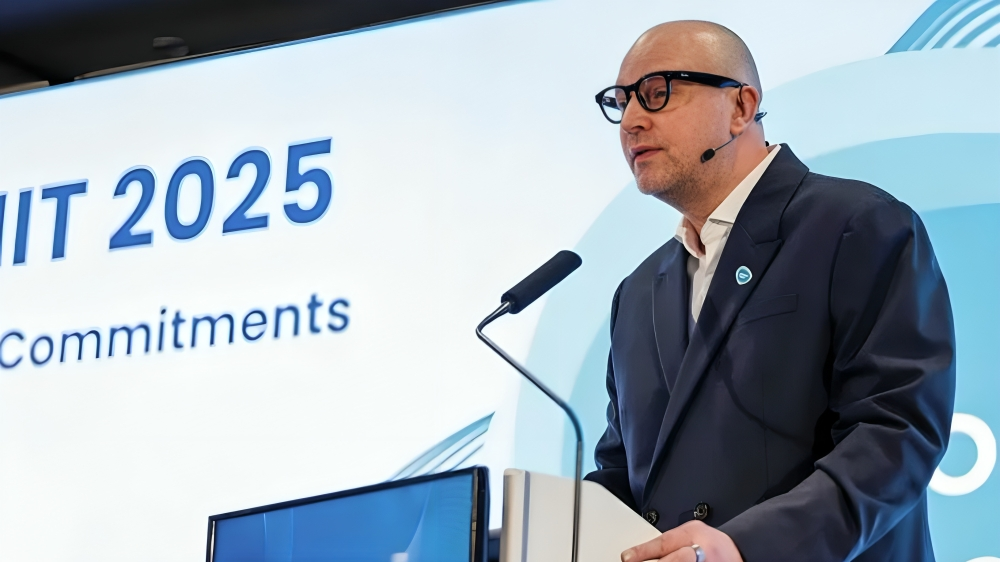Cancer in a Changing Global Landscape
Amid political instability and global uncertainty, the European Cancer Summit 2025 is bringing together the cancer community to address current challenges and plan future actions.
With increasing pressure on healthcare budgets and investments, it is essential to optimise resources and advance innovation. The community must build on previous progress while adapting to emerging issues to ensure continued patient care.
The Summit is taking place on 19–20 November in Brussels and online.
European Cancer Organisation (ECO) shared key highlights from European Cancer Summit 2025.
“That’s a wrap for Day1 of the European Cancer Summit 2025!
Today featured an array of sessions, interventions, meetings and spotlight presentations organised by ECO’s Focused Topic Networks and inspired by our community’s work.
Topics included:
- AI and new technologies in cancer care
- Cancer in the next EU 7-year budget
- Progress and challenges in HPV and Hep B elimination
- The future of screening programmes across Europe
Delegates also got exclusive early access to ECO’s latest reports. Discover some of them here
AI and Cancer Policy Paper
Cancer Screening Report
Cervical cancer policy paper
Watch some of the day’s highlights here and join us again tomorrow!”
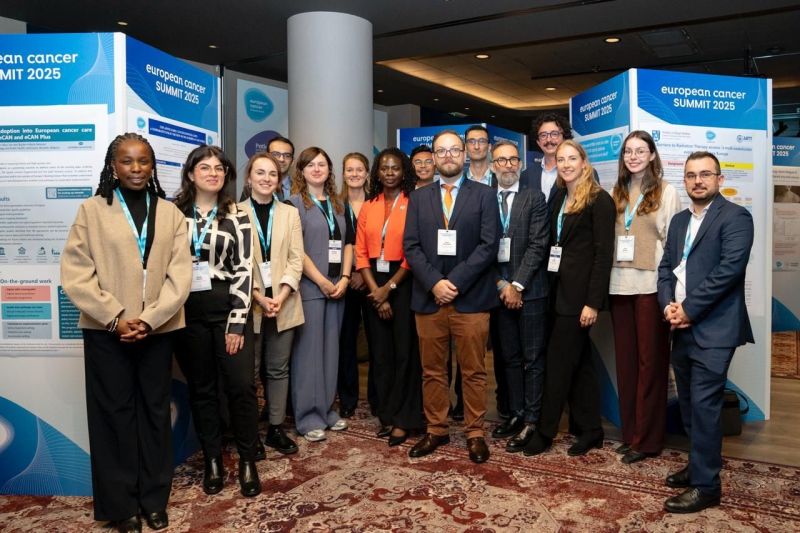
Men’s Cancer Care: Time for Action
“Men’s health deserves stronger attention in cancer policy, and Europe is stepping up.
At the European Cancer Summit, this Spotlight session looked beyond prostate cancer alone and explored the full range of challenges that men face across the cancer pathway. These include barriers to early detection, stigma that prevents men from seeking help, gaps in psychosocial support, unequal access to care and the specific needs of men in marginalised or high-risk groups.
The discussion highlighted how new technologies, EU collaboration and initiatives such as PRAISE-U can improve early detection for prostate cancer. It also underlined the need for broader action on a number of fronts.
- Strengthen gender-neutral HPV vaccination
- Provide more flexible access to primary care and screening
- Improve male participation in psychosocial and peer support
- Boost data collection and research on men’s cancer outcomes
‘In international men’s day, there’s one clear message: for prostate cancer screening and early detection is fundamental and we need to ensure implementation in national countries continue to improve.’
From new treatment approaches to the Screening and Early Detection Summit next February, the momentum is growing. Europe can save more lives by improving how men are supported, informed and cared for throughout the cancer journey.

Supporting Survivors Beyond Treatment
“Cancer survivors face physical, psychological, and social challenges, including:
- lingering health complications
- emotional distress
- financial insecurity
- stigma and more…
Are EU policies keeping pace?
Join the European cancer Summit to hear survivor testimony and insights drawing on the recently released ECO Survivorship and Quality of Life Policy Paper.
Meet some of the brightest minds in the cancer community discussing best practices, EU-funded research, and evidence-based guidelines, as well as barriers and opportunities for better post-treatment support.
Don’t miss this year’s European Cancer Summit!
19-20 November Brussels and online
Register now. europeancancer.org/summit.”
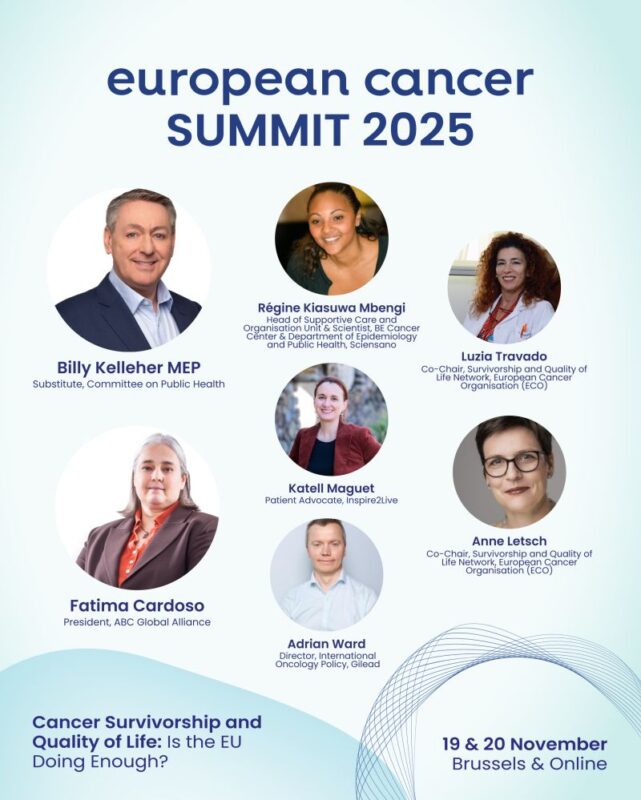
Putting Survivorship at the Centre
“How can Europe do more to support people living with and beyond cancer?
At the European Cancer Summit, experts, policymakers and patient advocates explore why survivorship and quality-of-life must become central pillars of cancer policy, not afterthoughts, and how to implement them effectively.
ECO’s new Survivorship and Quality-of-Life Policy Paper highlights the needs of both patients and survivors, revealing persistent challenges.
- The ’Right to Be Forgotten’ still isn’t implemented in many EU countries
- Employment laws often fail to support patients and carers
- PROMS and PREMS are underused to improve care experiences
- Palliative care and supportive services remain unevenly accessible across Europe
‘Access to finance is a key issue for cancer survivors. I believe we can address this at the policy level – we must advocate, command Member States to endorse the Right to be Forgotten. The trauma of not being able to buy a house is truly unacceptable and we must address this discrimination. I don’t accept that. Insurance is about burden sharing and we must act at haste.’, Billy Kelleher
Speakers underline that while the EU Beating Cancer Plan and the Cancer Mission have brought important progress, Europe must go further by embedding quality-of-life, equity and dignity into every stage of cancer care.
‘Many things are lacking in current frameworks: survivorship should simply be part of the cancer surveillance. Our asks are clear. Quality-of-life indicators should be collected to provide evidence for policy support. Patient experience such as inclusion in societies and return to work should be integrated in monitoring and surveillance’, Régine Kiasuwa, Head of Supportive Care and Organisation Unit and Scientist, Cancer Centre and Department of Epidemiology and Public Health, Sciensano, Belgium
This session also introduces the upcoming European Survivorship and Quality-of-Life Charter, which will translate the paper’s recommendations into clear policy actions to be launched next year.
Together, we can make sure that everyone affected by cancer can live longer and better lives. Read more about the Survivorship Network.
Download the Survivorship and Quality of Life Policy Paper.”
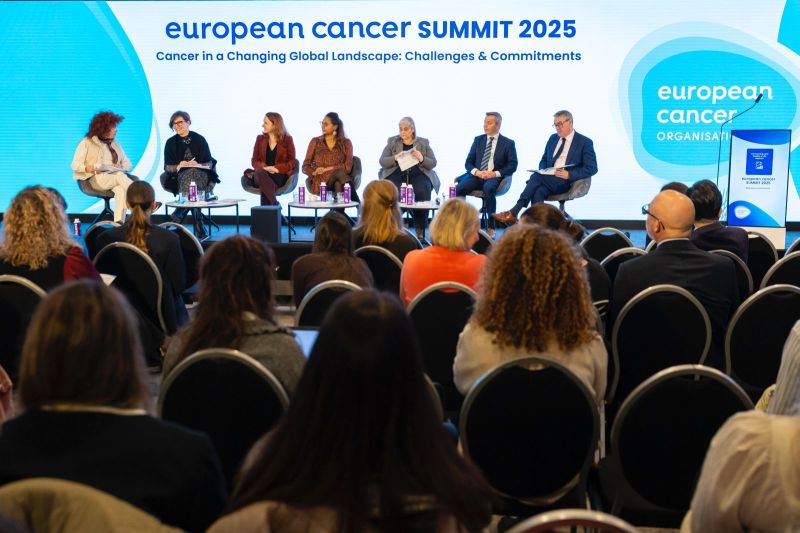
Addressing the Cancer Workforce Crisis
“Five years after the outbreak of the Covid-19 pandemic, there is still not enough attention on the challenges caused by shortages in healthcare workforce — and how these shortages affected emergency response efforts worldwide.
There is, however, growing recognition. At today’s European Cancer Summit 2025, we congratulate the Belgian Government for highlighting the health workforce during its Presidency of the EU Council.
‘There is a mismatch between the demand of care and the available workforce. The challenges we face may impact our European standards of care and dignity. To tackle this issue, the Belgian system has for example introduced a reform model and new professions. Some tasks can also be delegated to reduce pressure on nurses and doctors, ensuring patients receive the right care at the right time.’ Said Charlotte Poulussen, Policy Advisor, Deputy Prime Minister and Minister of Public Health, Belgium.
Momentum is continuing to build. Earlier this year, the European Cancer Organisation partnered with the American Society of Clinical Oncology (ASCO) and the Clinical Oncology Society of Australia (COSA) to publish a joint statement on the CancerWorkforce crisis, addressing global health workforce shortages and proposing shared solutions for creating and sustaining healthy workplace cultures in cancer care and research.
‘We need to shift the workplace culture into a human-centred one. Together, we can work towards achieving tangible impact.’ Said Sabe Sabesan, President, Clinical Oncology Society of Australia (COSA).
The recommendations from ECO’s 2024 report on the cancer workforce crisis remain as relevant as ever. We need European institutions to work with national governments to develop a comprehensive cancer workforce action plan that delivers:
- Healthy work environments that support the mental and physical wellbeing of the workforce
- Investment in the skills and knowledge of cancer professionals
- Career support across all roles within the cancer workforce
- Harmonised and fully digitised healthcare systems to reduce bureaucratic burden
Training programmes like INTERACTEUROPE100 are examples of meaningful investment in the cancer workforce. More than 900 professionals across Europe are now training to strengthen interprofessional approaches to cancer care — and this is already paying off in improved patient outcomes.
We must continue to invest in our cancer workforce so they can continue to care for patients.
Learn more about the Joint ECO–ASCO–COSA statement here.
Learn more about the ECO paper on the cancer workforce crisis here.
Learn more about INTERACT-EUROPE 100 here.”
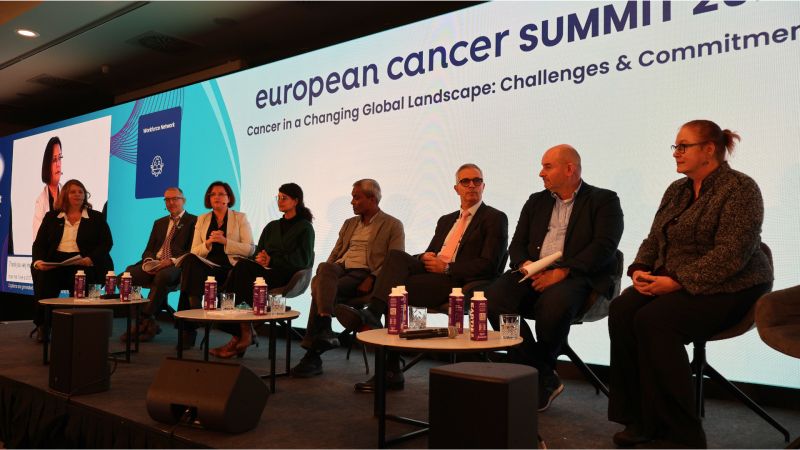
Strengthening National Cancer Plans
“National Cancer Control Plans (NCCPs) are essential tools for governments to strengthen cancer prevention, ensure access to timely and effective treatment, and provide high-quality supportive care—adapted to each country’s needs and resources.
As countries across Europe develop or update their cancer strategies, reviewing existing plans offers invaluable lessons. At today’s European Cancer Summit 2025, experts are exploring what has worked, where gaps remain, and how we can drive more coordinated, impactful, and patient-centred cancer policies across the continent.
A well-designed and effective NCCP needs to be:
- Properly funded
- Data-driven
- Adapted to national realities
- Built with strong civil-society involvement
- Focused not just on strategy, but on implementation — including in remote and rural areas
‘Implemented national cancer plans bring everyone around the same table: clinicians, policymakers, researchers, and patients. That shared ownership is what drives lasting improvement. But a strong National Cancer Control Plan most important area is its implementation and evaluation progress. We also need to acknowledge that implementation often includes more actors at the national level and public authorities; and only when funding, data, and coordination work together, real progress follows.’ Said Tit Albreht, Health Services Research, University of Amsterdam and Head of the Centre for Health Care, National Institute of Public Health of Slovenia and Senior Researcher in the field of health services research, health policy and health systems research and Member of the Scientific Committee, EUPHA.
One of the persistent challenges is the inclusion of rare cancers. Too often, they are not systematically integrated into national plans, resulting in major disparities in access, expertise, and outcomes across EU Member States.
The EU Beating Cancer Plan has been a powerful catalyst of robust national cancer control plans across Europe — and this is one of its major successes. As we look ahead to the next EU budget, it is crucial that these achievements are safeguarded and further strengthened.
‘Belgium’s journey shows that national action and European direction complement each other. The EU Beating Cancer Plan has provided a powerful framework that helped us refine priorities, expand prevention efforts, and reinforce quality across our cancer system.’ Said Marc Van Den Bulcke, Head of Service, Belgian Cancer Centre, Sciensano, Belgium.
Together, we can build cancer policies that leave no patient behind.”

Collaborating for HPV Elimination
“Progress towards HPV elimination starts with collaboration.
Today’s meeting at the European Cancer Summit revisits our Southeast Europe declaration, which calls for united action to eliminate HPV-related cancers in the region and beyond.
You can still join and give us your support! Together, we can bridge the gaps in vaccination, screening, and treatment.
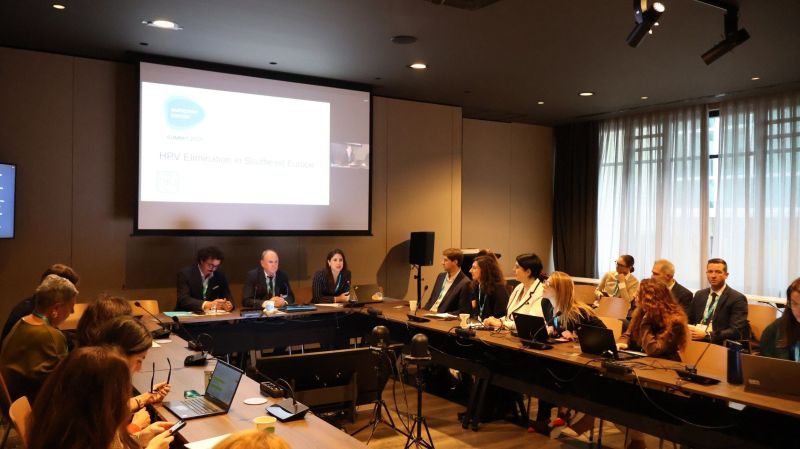
Shaping the Future of Cancer Care
“Europe’s cancer community is navigating unprecedented times: from workforce shortages and the integration of new technologies to political instability affecting research and prevention policies.
Now more than ever, we need to envision the future of cancer care. At the European Cancer Summit, Young Cancer Professionals are taking the lead, shaping a bold vision for cancer care in 2050.
Their energy, ideas, and commitment are driving the next generation of innovation and collaboration across Europe.
Sandrine Daoud, Advisor and Spokesperson for Belgian Minister of Social Affairs & Public Health, Frank Vandenbroucke, explains Belgium’s strategy for lung cancer prevention:
‘Barriers to stop smoking should be as low as possible, and barriers to start smoking should be as high as possible. In Belgium, you don’t see tobacco products anymore. You have to ask for them. This is what we call a display ban. Together, we should adopt these rules across the whole Union.’ “

Advancing Cancer Research in Europe
“At the European Cancer Summit now ongoing in Brussels, leaders in research and policy are now exploring how Europe can take cancer research to the next level, through stronger cooperation, innovation, and lasting investment.
This session looks at how the EU Cancer Mission has reshaped research collaboration across Europe and what is needed next, – starting with a proposed European Cancer Institute.
“Cancer is not just about care, it is research and care together. Cancer research in Europe needed a cultural shift, and through the Cancer Mission we have worked to drive this transformation. We now need to accelerate it.” Christine Chomienne, Co-Chair of the ECO Research Policy Network
Discussions also reflect on clinical trials and data-sharing to ensure that innovation can benefit all patients equally.
“Our knowledge base is growing exponentially, not only in the sheer volume of data, but also in the tools we now have to use it effectively. We will always need to demonstrate that new treatments outperform standard therapies, and this demands stronger collaboration. We need a mindset shift on cancer research issues, and we must work together with institutions to seize the opportunities for innovation.” Brian Huntly, President-Elect, European Hematology Association (EHA) & Head of Department of Hematology, University of Cambridge, United Kingdom
The future of cancer research in Europe starts here. Curious? Read our paper and give us your thoughts.
Wait. There’s more! Join us tomorrow morning for the ECHoS Town Hall Meeting, where organisations across Europe will join to shape the future of EU research in cancer.”
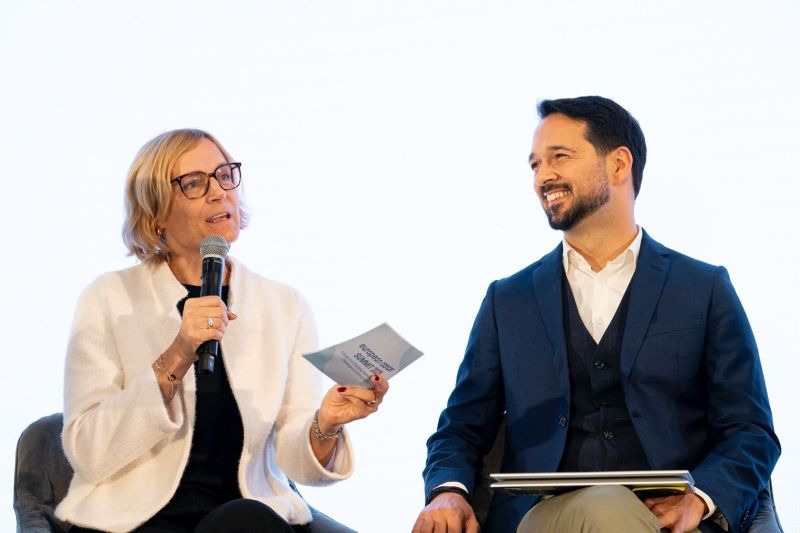
Delivering Cancer Care No Matter What
“In a world where the unimaginable is no longer unthinkable, the cancer community must be ready to deliver care No Matter What.
This year’s session, organised by the Emergencies and Crises Focus Topic Network, explores
- expert experiences in conflict-ridden areas like Ukraine & Palestine,
- growing threat of antimicrobial resistance, the second leading cause of death after cancer itself, and
- lessons from COVID-19, including workforce shortages and the need for real-time data.
‘No healthcare system in the world is ready for full-scale war, and neither should it be,’ said Eric Adrien, Policy Officer for Emergency Response Operations at the European Commission
‘Despite all the constraints, the Ukrainian national cancer control strategy includes early detection and screening programmes, HPV cancer elimination and prevention programmes,’ added Arman Kacharian, Medical Director of the National Cancer Institute in Ukraine
‘Let’s ensure that in the darkest moments of war, no one facing cancer is ever left behind,’ said Kathy Oliver, Co-Chair, European Cancer Summit & Co-Chair, Patient Advisory Committee, European Cancer Organisation (ECO) & Chair and Co-Director, International Brain Tumour Alliance (IBTA)
Together, we push for unity and coordinated action at the European level, and for resilient cancer care.”
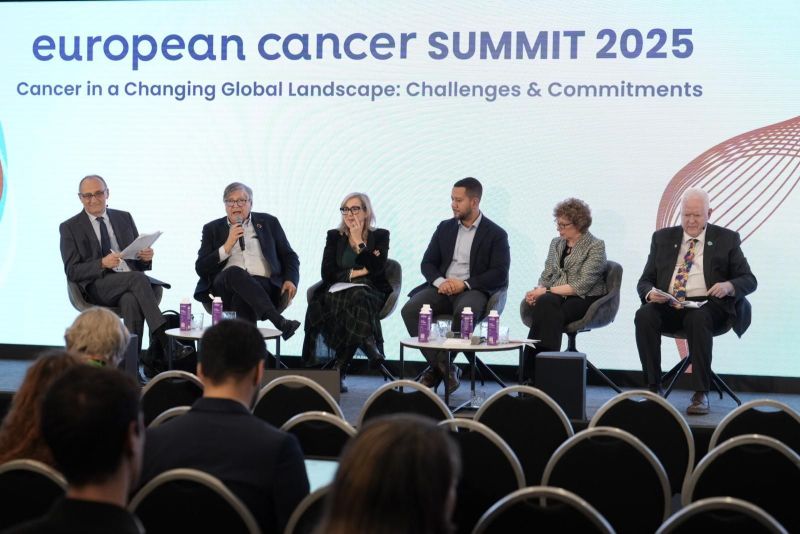
Read more about European Cancer Summit 2025 on OncoDaily.


